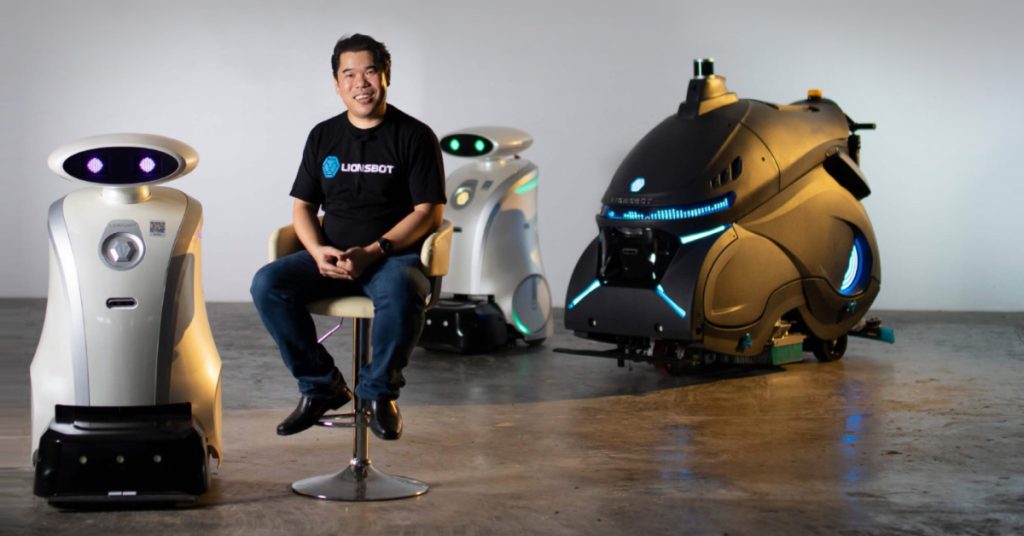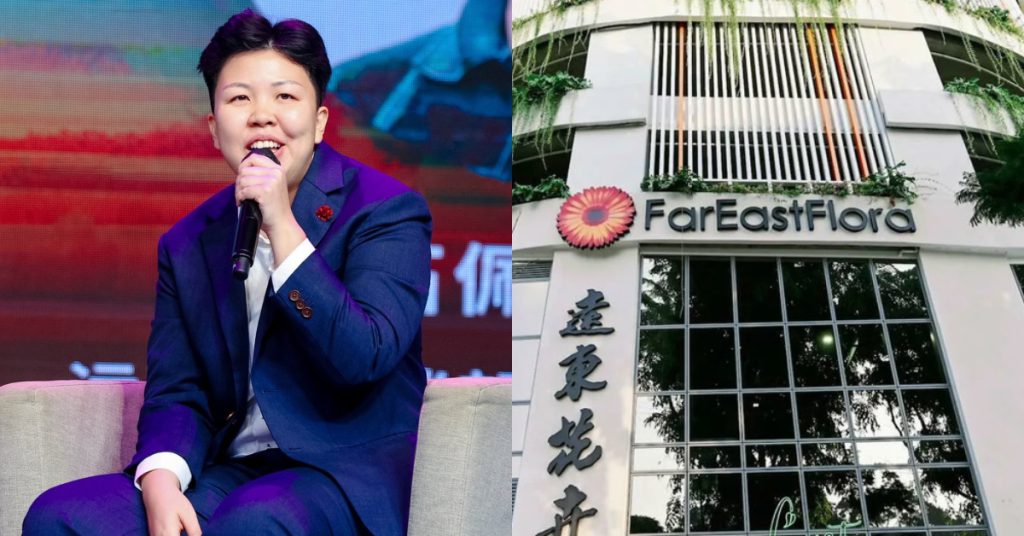With the holiday season around the corner, many Singaporeans are gearing up for their year-end travels—and if you’re one of them, you might have spotted animated robots gliding around the airport, diligently cleaning the premises.
These innovative cleaning robots are not just limited to Changi Airport—they’re also hard at work at hospitals, offices and various other locations globally, including The Shard and Wembley Stadium in London, and Dubai’s Festival City Mall.
But did you know that these high-tech robots are proudly made in Singapore?
The mastermind behind them is LionsBot—one of the fastest growing companies in Singapore, ranking fifth in The Straits Times‘ annual list. Their story, however, began with humble roots.
Meet the founding team behind LionsBot

At the helm of LionsBot is husband-wife duo Dylan Ng and Michelle Seow, and Dr. Mohan Rajesh Elara, who joined the business later on.
Dylan first met Michelle during their university days, when he sparked a conversation with her by showing off his PalmPilot. Their entrepreneurial journey took shape when a friend approached them with an opportunity to sell steam cleaners on commission.
“We’re risk-takers and had nothing to lose,” said Dylan. “Being marketing majors and having studied selling dreams for a living, we wanted to start our own business.”
So the pair jumped in, unaware that this decision would set them on the path to building a multi-million-dollar cleaning empire.

After graduating, Dylan and Michelle pooled their entire savings of S$2,000 each to launch their first company—SuperSteam, a distributor of professional cleaning equipment and chemicals.
Determined to make it work, they conducted thorough market research, rehearsed their sales pitches, and began their journey with door-to-door sales demonstrations. Revenue trickled in sporadically, and each day brought its own challenges—hauling heavy equipment up flights of stairs, facing rejection, and pushing through exhaustion.
“We rented a van at S$50 per day, which was all the money we had, so we often skipped lunch to buy petrol,” Dylan said in an interview with CNA. At their lowest point, they had to relocate their operations from an office to Dylan’s mother’s garage.
Yet, with support from family, friends, and early customers, they pressed on. Eventually, Dylan and Michelle pivoted business their strategy, shifting their focus to commercial clients like food manufacturers instead of individual consumers.
This strategic shift paid off, and their business began to pick up—but it was during this time that they identified significant challenges within the cleaning industry.
One of the prominent issues was the shrinking manpower, coupled with an aging workforce, which was a trend not just in Singapore, but globally. We foresaw a sustainable solution in utilising autonomous cleaning robots that could assist the elderly workforce while also addressing the manpower crunch.
Dylan Ng, co-founder and CEO of LionsBot

With this goal in mind, they began exploring robotic solutions to offer their clients. It was also around this time that the government launched a new initiative to support automation, which further motivated them to take the leap into manufacturing cleaning robots.
“To our dismay, we couldn’t find something that precisely met our criteria,” shared Dylan. But as fate would have it, they soon received an unexpected phone call from a teammate of Dr. Mohan.
Dr. Mohan, an associate professor at the Singapore University of Technology and Design, had been researching intelligent cleaning robots for some time. His team had purchased one of Supersteam’s traditional cleaning machines and successfully made it semi-robotic.
Although it had been a prototype, the duo immediately recognised the potential of Dr. Mohan’s creation—it was the missing piece they had been searching for. By combining their expertise in cleaning solutions with Dr. Mohan’s robotics knowledge, LionsBot was launched in 2018.
“We couldn’t do everything for everyone”

With a team of five engineers, LionsBot developed their first prototype in just seven months. This may seem like a significant achievement, but Dylan pointed out that it was only the beginning for the company.
“It’s easy to create a prototype, but building a reliable product is much harder,” he explained. “The robot needs to operate day in and day out without any issues.”
Even when they got past that hurdle, LionsBot’s journey remained anything but smooth. “We were very happy for [our robots] to work in our office,” he recalled.
But when selling our products, we had to make sure it works in other people’s offices, buildings, and corridors—places you don’t always see. Every environment is different, even factors like shiny lights or reflective floors can create new challenges for the robots.
Dylan Ng, co-founder and CEO of LionsBot

In the early stages, their products required constant improvement, but they also faced challenges in determining where to focus their efforts.
“Everything seemed important. Maybe to close a deal for a customer, we had to make a special feature—but as we chased that, we realised that it might not be ideal for other clients,” shared Dylan.
At the time, many also had unrealistic expectations of what a cleaning robot could do. “Not a lot of people have seen their capabilities, so they expected the world from it.”
After making some “costly mistakes” and seeing their teams “burnt out,” they quickly learnt that prioritisation was crucial. “We couldn’t do everything for everyone—sometimes learning how to say no is important.”
LionsBot has sold over 2,500 robots to date
LionsBot has now “gotten the hang of things” after selling to “enough clients” and seeing real-world situations. “We know what works and what doesn’t,” said Dylan.
For example, the company eventually decided to phase out their LeoBots, which initially gained significant attention for their ability to sing, rap, and even speak Singlish.

“Singing and rapping are fun, and they were easy to do in English,” Dylan explained. “But it’s very difficult to execute in languages like Lithuanian, Estonian, Hungarian, and other diverse languages.”
Moreover, he added that some of his clients wouldn’t want the robots to speak, especially in quiet environments.
Instead of offering English-speaking robots, LionsBot’s robots now interact with people through a series of beeps, and come with digital displays that can convey certain human emotions. “Annoyance, rolling eyes—those are universal languages,” Dylan laughed. “It’s international.”

To date, LionsBot has sold over 2,500 robots to over 30 countries—and according to Dylan, their robots are now considered the “highest performing robots.” The company has also seen significant breakthroughs with AI, which has doubled their cleaning performance.
Although LionsBot has yet to turn a profit, Dylan hopes to double the company’s sales revenue to S$41 million this year and achieve profitability by 2025. A key step towards this is their newly launched S$12 million manufacturing facility in Kranji, which can quadruple the company’s production output compared to its older facility in Changi.
Looking forward, LionsBot is also eyeing another major milestone: to be listed on NASDAQ by 2027. “The decision to go public is driven by our growth trajectory and the need to enhance our credibility on a global scale,” Dylan explained.
Currently, the company is focused on key markets in Europe, the USA, as well as developed markets in Asia, including Australia, South Korea, Japan, and Singapore.
“As we grow in these markets, we need more local support and deeper market penetration. Going public will provide the necessary resources to seriously develop each market and continue our expansion.”
Featured Image Credit: Lionsbot










